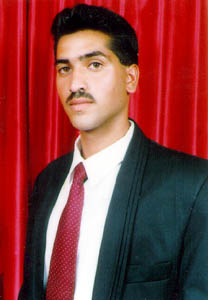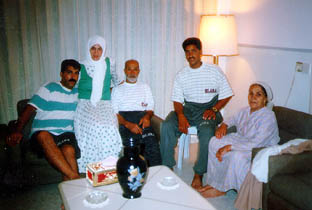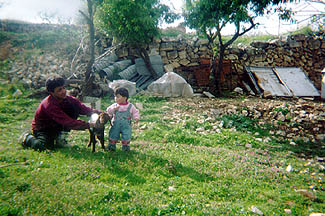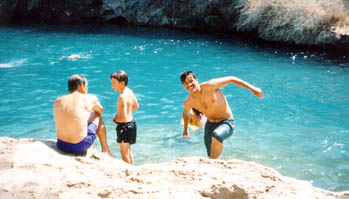





PERSONAL STORIES
"To me he is not dead"
Fayez Mashare Mohammed Farahan, "Abu Islam", aged 21, Al-Bireh.

Right: A studio photo of Fayez.
Fayez took good care of his parents and his mother jokes that even his birth was easy. They remember him as a revolutionary, an activist, honest and full of committment to his people.
Fayez was deeply religious. He spent most of his time at the mosque after work, praying and reading the Quran. His friends used to laugh at his committment to prayer, saying, "You pray so avidly it is like someone is paying you a salary." After praying he would exercise, water his garden, then go to his job. He would never stay longer than 4 pm, take lunch, than go and pray. He also used to maintain the garden at the mosque. He loved nature and planted roses and vines around his house.
He liked to listen to Islamic songs and he kept up hs religious duties at the mosque near his house. One of his friends from the mosque said, "Fayez was a kind-hearted guy. Hatred is something he never knew. He never frowned. Two days before he died he asked me to take responsibility for his wedding arrangements. Instead of a wedding party we had a martyrdom party, and the same band that was supposed to sing at his wedding sang at his funeral." His friends used to call him Abu Islam ("Father of Islam"). He was self-confident and never paid attention to gossip.
He used to visit his married sisters each morning and have breakfast with one of them. His favourite cuisine was maqlubi (lit. "upside down", a Palestinian chicken and rice dish, so-called because it is cooked and then turned over onto the serving dish) and he used to only drink water. He loved vegetables, especially lettuce and cucumber.

Above: Fayez (second from the right) and his family.
He liked to play with his nephews and nieces especially Mashroun, the son of his brother. Mashroun remembers that whenever his grandfather got angry with him, Fayez would defend him.

Above: Fayez plays with a nephew.
Fayez did not like school and left it at an early age. He liked work more than education. He worked as a central heating technician and as a construction worker. Before he died he used to work on building his own house which was completed until a few days before his death. His family found the keys to his house a few metres from where he was buried, after they apparently fell from his pocket.
His fiancee was chosen for him by his sister as he was very shy around women. She said that at the time of the clashes she had marched at the front - he saw her and gave her a disapproving look so she moved to the back. That was her last memory of him.
He never really worried about his future except in relation to soccer. This optimistic attitude to life was reflected in his two favorite phases, "Forget it" and "Consider it done". He also liked the religious saying, " A smile in your brother's face is a virtue." He loved soccer and played in the Ramallah Islamic team. He also coached children at the local school. To relax he used to watch soccer on the TV.

Above: Fayez (right) and friends.
Fayez was imprisoned for 6 months during the Intifada and was affiliated to the Hamas movement. He used to argue about politics with his father who would say "Do you want to bring destruction to this house?" Fayez would answer "Don't worry".
His sister's wedding was the same day as his death. He performed all his duties, taking her to the hairdresser and bringing the chairs for her, but he never returned. He also had an appointment with his brother. Since? his death, his sisters refuse to go to weddings or parties.
He was shot on Thursday 26 September 1996 at the entrance to Al Bireh City by 30mm explosive bullets from a helicopter. He was buried the next night with other martyrs. One friend recalls, "According to the Islamic tradition we buried him the way he died, without preparing his body in any way. To me he is not dead." His father, who dug Fayez's grave, stopped work after his death and now visits the site daily.
Fayez was originally from Qalulina, 7 km from Jerusalem. When his father first took him there to visit their former home, he was amazed by the beauty of the place. Recovering from his speechlessness he asked his father, "Why did you abandon this land and leave it to the Israelis? It would have been much more honourable to die than flee."
Back to PERSONAL STORIES or on to the NEXT STORY